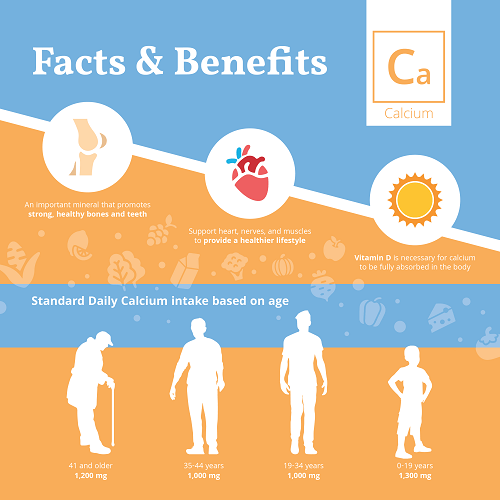 As we get older, calcium is one of the most vital nutrients for healthy bones and preventing muscle weakness that’s associated with aging. Osteoporosis, which literally means “porous bone,” is a common and mostly preventable condition in which the quality of one’s bones and their density are reduced. This is a condition that happens gradually, and sometimes no symptoms are recognized until a bone break or fracture occurs.
As we get older, calcium is one of the most vital nutrients for healthy bones and preventing muscle weakness that’s associated with aging. Osteoporosis, which literally means “porous bone,” is a common and mostly preventable condition in which the quality of one’s bones and their density are reduced. This is a condition that happens gradually, and sometimes no symptoms are recognized until a bone break or fracture occurs.
Muscle weakness brings along associated frailty, fatigue, and reduced ability to tolerate activity. With a calcium shortage, joint problems may occur, ranging from mild stiffness to system-wide debilitating arthritis, or osteoarthritis.
Why Calcium Deficiency in Seniors is Detrimental for Bones and Overall Health
Not so long ago, calcium intake was considered a primary concern for children. Today, research reported by the International Osteoporosis Foundation (IOF) shows that appropriate calcium consumption can reduce the risk of osteoporosis, bone fractures, and even diabetes at any age, but even more so for seniors.
Causes of Calcium Deficiency
Education surrounding calcium and its effects on the body is especially important to women. During adolescence, females should be intaking proper dietary calcium and starting a habit of weight-bearing exercise to increase bone density. Adolescence is when bone growth and bone formation is most critical. Later in life, women, in particular, are at the highest risk of weak bone structure.
Calcium is often reduced in seniors because of these additional factors:
-
A changed diet with fewer calories overall to reflect changing body needs, which eliminates some calcium-rich foods,
-
A decreased absorption of calcium in the intestinal tract (especially if deficient in vitamin D).
-
A decrease in the kidneys’ functioning, causing the kidneys to retain calcium, which results in higher calcium loss through the urine.
-
Lactose intolerance, which is brought on by lactase deficiency, a common cause of low calcium intake.
It is surprising to learn that calcium is not absorbed in the stomach. Instead, calcium absorption occurs throughout the gastrointestinal tract.
Individuals with milk allergies or who are lactose intolerant often exhibit calcium deficiency.
Symptoms of Calcium Deficiency
Early signs of calcium deficiency include cramps, muscle aches, and spasms. People report pain in their arms and underarms, as well as their thighs. Other signals of calcium deficiency include numbness and tingling in the feet, legs, arms, hands, and around the mouth area.
Calcium Food Sources
 In the typical American diet, the primary sources of calcium in our diet include dairy products (yogurt, milk, and cheese) and calcium-fortified foods, such as orange juice, bread, and cereals. Interestingly, anchovies, soy, and kimchi also amp up calcium consumption.
In the typical American diet, the primary sources of calcium in our diet include dairy products (yogurt, milk, and cheese) and calcium-fortified foods, such as orange juice, bread, and cereals. Interestingly, anchovies, soy, and kimchi also amp up calcium consumption.
Another beneficial food to increase calcium is kefir, which is a drinkable yogurt product that is almost totally lactose-free due to fermentation. Kefir provides probiotics to keep gastrointestinal flora healthy.
It’s important to know that calcium metabolism is influenced by combining with vitamin D, protein, and phosphorus.
Calcium Supplementation
While one’s diet is the preferred target to improve calcium, for the elderly, dietary calcium may not be enough for bone health. You should know that calcium metabolism is influenced by combining with vitamin D, protein, and phosphorus. Getting vitamin D through the diet or via supplements with your calcium intake allows the calcium to be available better than just taking calcium supplements alone.
For reputable calcium supplements, turn to Natural Options USA, which sells two total solution supplements as described below:
OsteOrganiCAL Plus is a supplement with highly absorbable organically-sourced calcium, which is extracted from algae, combined with vitamins D3 and K2, to enhance your body’s ability to absorb calcium. Backed by science, this supplement will fortify your bones. Algae calcium is plant-based calcium derived from algae. This form of calcium is superior to other calcium obtained from rock, and it is much more easily absorbed by your body.
In this bone health supplement, the property of plant-based algae calcium combined with naturally sourced vitamin D3 is a vital solution for damaged and brittle bones. This type of bio-ready calcium has helped thousands of people to improve their active lifestyle, get better mobility, and straighter posture.
OsteOrganiCAL® + Osteo D3 This signature bone health duo combines the healthy properties of algae calcium along with naturally sourced vitamin D3. The two products work in tandem, providing an efficient and complete solution for aging, brittle, and damaged bones.
It’s a lot easier to take a daily supplement as a preventative measure than to deal with bone fractures or breaks, which may mend more slowly in the elderly.


Comments